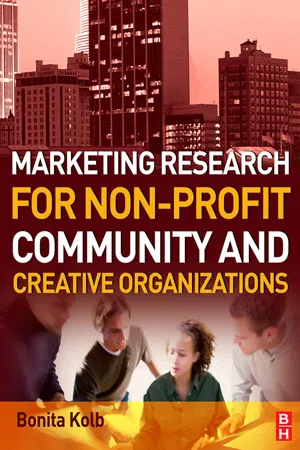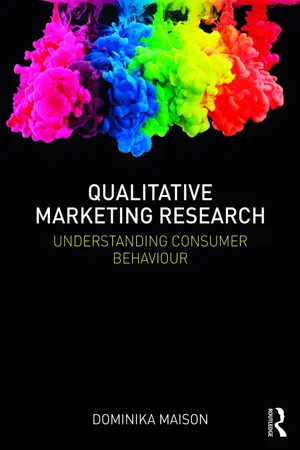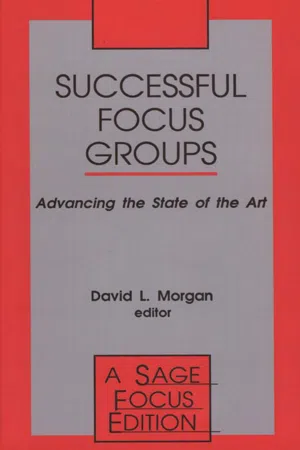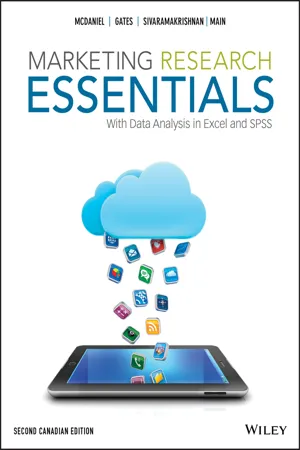Marketing
Focus Groups
Focus groups are a qualitative research technique used to gather insights and opinions from a small, diverse group of people. Typically led by a moderator, participants engage in open discussions about a specific product, service, or concept. The aim is to uncover consumer perceptions, preferences, and attitudes, providing valuable input for marketing strategies and product development.
Written by Perlego with AI-assistance
Related key terms
1 of 5
11 Key excerpts on "Focus Groups"
- eBook - PDF
- Carl McDaniel, Jr., Roger Gates(Authors)
- 2020(Publication Date)
- Wiley(Publisher)
Normally, in group dynamics, direct questions are avoided. In their place are indirect inquiries that stimulate free and spontaneous discussions. The result is a much richer base of information, of a kind impossible to obtain by direct questioning. Popularity of Focus Groups How popular are Focus Groups? Most marketing research firms, advertising agencies, and consumer goods manufacturers use them. Today, most marketing research expenditures for qualitative research are spent on Focus Groups. Over two-thirds of all qualitative research dollars are spent on Focus Groups. 3 The majority of focus research projects in the United States take place in over 750 focus facilities and are directed by over 1,000 moderators. The most common formats of qualitative research are Focus Groups and individual depth inter- views. Today, both forms of qualitatives are being conducted online and on mobile devices, as we will discuss in Chapter 8. focus group Group of 8–12 participants who are led by a moderator in an in-depth discussion on one particular topic or concept. group dynamics Interaction among people in a group. 150 CHAPTER 7 Qualitative Research Focus Groups tend to be used more extensively by consumer goods companies than by industrial goods organizations, as forming industrial groups poses a host of problems not found in consumer research. For example, it is usually quite easy to assemble a group of 12 homemakers; however, putting together a group of 10 engineers, sales managers, or financial analysts is far more costly and time-consuming. Lewis Stone, former manager of Colgate-Palmolive’s Research and Development Divi- sion, says the following about Focus Groups: If it weren’t for Focus Groups, Colgate-Palmolive Co. might never know that some women squeeze their bottles of dishwashing soap, others squeeeeeze them, and still others squeeeeeeeeze out the desired amount. - No longer available |Learn more
Market Research in Practice
An Introduction to Gaining Greater Market Insight
- Paul Hague(Author)
- 2021(Publication Date)
- Kogan Page(Publisher)
06Focus Groups
The focus group
The focus group is a research tool used to collect data through group interaction on a topic. Essentially, it is a group experience comprising a small number of carefully selected people who are recruited to discuss a subject on the basis of their shared experience.Focus Groups have four key characteristics:- They actively involve people.
- The people attending the group have an experience or interest in common.
- They provide in-depth qualitative data.
- The discussion is focused to help us understand what is going on.
Focus Groups have traditionally taken place in a face-to-face environment, with all participants brought together in one location for a given period of time to discuss the research topic. However, technological advances have made it possible to bring groups together online, overcoming the barrier of participant proximity to the focus group venue. Online groups tend to adopt one of two styles: the ‘live chat’ forum or the ‘bulletin board’ group, which tends to remain open and live for several days but does not require participants to be logged in during the whole period.The people that make up a focus group
Focus Groups typically are made up of five to 10 people. The group needs to be small enough to allow everyone the opportunity to share insights, and yet large enough to provide group interaction and diversity of experience. Larger face-to-face groups inhibit discussion, as some delegates shy away from venturing opinions, while smaller groups may be limited in their pool of ideas. Bulletin style online groups afford the opportunity for a larger number of participants.Commonality of experience and interest
Focus group participants have a degree of homogeneity, and this is important to the researcher. This similarity is the basis for recruitment, and indeed, specific requirements are usually necessary for attendance at the group. - eBook - PDF
- Carl McDaniel, Jr., Roger Gates(Authors)
- 2016(Publication Date)
- Wiley(Publisher)
Focus Groups are much more than merely question‐and‐answer interviews. A distinction is made between group dynamics and group interviewing. The interaction associated with group dynamics is essential to the success of focus group research; this interaction is the reason for con- ducting research with a group rather than with individuals. One idea behind Focus Groups is that a response from one person will become a stimulus for another person, thereby generating an interplay of responses that will yield more information than if the same number of people had contributed independently. The idea for group dynamics research in marketing came from the field of social psychology, where studies indicated that, unknown to themselves, people of all walks of life and in all occupa- tions would talk more about a topic and do so in greater depth if they were encouraged to act spontaneously instead of reacting to questions. Normally, in group dynamics, direct questions are avoided. In their place are indirect inquiries that stimulate free and spontaneous discussions. The result is a much richer base of information, of a kind impossible to obtain by direct questioning. Popularity of Focus Groups How popular are Focus Groups? Most marketing research firms, advertising agencies, and con- sumer goods manufacturers use them. Today, most marketing research expenditures for qualita- tive research are spent on Focus Groups. The majority of focus research projects in the United States take place in over 750 focus facilities and are directed by over 1,000 moderators. The most common forms of qualitative research are Focus Groups and individual depth interviews (IDIs). Today, both forms of qualitative are being conducted online and on mobile devices, as we will discuss in Chapter 6. Focus group research is a globally accepted form of marketing research. It is estimated that over 650,000 Focus Groups are conducted worldwide each year. - Bonita Kolb(Author)
- 2008(Publication Date)
- Routledge(Publisher)
Focus Groups are considered exploratory research because an issue or problem is being explored. For this reason Focus Groups are often one of the first choices of research methodology when little is known about the cause of a problem. Once Focus Groups have been used as a first step in exploring an issue, the findings can be confirmed using a quantitative research technique such as a survey. Focus Groups are sometimes misunderstood as mere discussion groups where people just talk while a moderator listens. However, a well designed focus group conducted by a trained moderator is much more. The purpose of a focus group is to encourage participants to go beyond their first response to the issue being discussed. Interaction with the moderator and also between the group members is designed to uncover deeper insights which can be used to develop new and creative ideas for the marketing mix. In addition, these insights can then be communicated to groups within the organization to build the case for support of the marketing programme (Hanson, 2001). Focus Groups do not start with a hypothesis about the cause of a problem. Instead they are used to generate new ideas for the organization. In addition they can be used to explore reasons for an organization’s problems or failures. In a focus group ideas for a new consumer segment to target, new ways of packaging a product and more effective promotion can be generated. Purposes of conducting Focus Groups Exploring the cause of a problem or issue New market segments to target Enhancing the product to increase its appeal Developing effective promotional campaigns Exploring problems: When an organization has a problem, it is tempting to try to solve the issue internally. However, the employees of the organization can only see the problem from their own viewpoint. While these insights are important it is extremely helpful to get the opinions of current or potential consumers as to the cause of the problem- eBook - ePub
Qualitative Marketing Research
Understanding Consumer Behaviour
- Dominika Maison(Author)
- 2018(Publication Date)
- Routledge(Publisher)
3 Qualitative methods The different tools in the hands of a marketing researcher Classic qualitative marketing research methods: focus group interviews and individual in-depth interviewsFocus group interviews (FGIs), also called focus group discussions (FGDs), are the most commonly commissioned type of qualitative research in marketing (Belk, Fischer, & Kozinets, 2013; ESOMAR, 2016; Greenbaum, 1993). The greater number of group discussions compared to individual interviews in the marketing context is mainly down to fashion (being considered more spectacular) and convenience (shorter performance times, ease of interview observation by clients), not actual methodological premises. From methodological point of view both methods are essentially very similar and can often be used interchangeably. This doesn’t mean that both methods are identical as certain differences do exist between them, thus, when deciding whether a group or individual interview is more suitable, we must be aware of the consequences of using each of these methods (see Table 3.1 ).A focus group interview is a discussion between several people, usually about six to eight, led by an interviewer, called a moderator. The moderator’s task is to guide (focus) the interview appropriately in order to find out as much as possible about the research subject (Cowley, 2000). This approach has four characteristic elements: (a) it is carried out in a group setting (several participants), (b) it is focused around (concentrates on) a specific topic, (c) the conversation is in-depth (not superficial), and (d) it is in the form of a discussion, not just a question and answer session. Its theoretical basis is two main fields of knowledge: (a) qualitative research methods (individual in-depth interviews, observations, and projective techniques), (b) social psychology – knowledge on small groups, their dynamics, and group processes (drawing from what is known about therapeutic groups, support groups, and interpersonal training). - eBook - ePub
- Andrew Whittaker(Author)
- 2012(Publication Date)
- Learning Matters(Publisher)
Focus Groups have entered the popular imagination following their controversial use in the early years of the New Labour Government (Barbour and Kitzinger, 1999). Although group interviews have a long history in market research and were used to evaluate propaganda during the Second World War, it is only relatively recently that Focus Groups have become a popular and respected research method in the social sciences (Morgan, 1997).Focus Groups are versatile and have been used for a wide range of topics. For example, Focus Groups have been used to research infertility in British South Asian communities (Culley, et al., 2007), children’s experiences of mental health services (Day, et al., 2006), women’s health in rural India (Vissandjée, et al., 2002), female genital mutilation in Switzerland (Thierfelder, et al., 2005), and access to out-of-hours health services by members of the Vietnamese community in London (Free, et al., 1999).Defining Focus Groups
A focus group is a group of individuals selected to provide their opinions on a defined subject, facilitated by a moderator who aims to create an open and relaxed environment and promote interaction between participants. Rather than an interview with a number of participants giving their views, Focus Groups enable discussion between participants (Kitzinger, 1994). Such discussions can enable participants to explore and challenge each other’s views and can result in people clarifying and changing their views.Combining Focus Groups with other research methods
Focus Groups are often used on their own, but can be combined with other research methods such as surveys or interviews (Morgan, 1993, 1997). Focus Groups can be used before a survey to provide an overview and test the range of opinions which will be used in questionnaire construction. For example, the Scottish Executive used Focus Groups to develop a national survey for people from minority ethnic communities (Scottish Executive, 2003).Interviews can be used in conjunction with Focus Groups where participants may disclose more sensitive information than they would in a group setting. While Focus Groups are effective in accessing shared, public knowledge, interviews are fruitful for more personal, biographical information. For research topics that require both forms of knowledge, combining both methods can be productive. - eBook - PDF
Food Culture
Anthropology, Linguistics and Food Studies
- Janet Chrzan, John Brett, Janet Chrzan, John Brett(Authors)
- 2017(Publication Date)
- Berghahn Books(Publisher)
Focus Groups did not become a standard methodological option for scientific researchers until the 1980s, and their use remains limited primarily because they are labor-intensive and require as much work afterward as they do in their design and execution. Their use, how-ever, can also save a researcher much time, expense, energy, and embarrassment over misunderstood meanings and practices. Material on Focus Groups emerged in social science methods handbooks in the late 1980s and early 1990s (Morgan 1996; Krueger 2008) and now forms a part of most comprehensive handbooks. The multiplicity of uses and structures has also resulted in a series of handbooks dedicated to Focus Groups alone, many of Focus Groups in Qualitative or Mixed-Methods Research 103 them speaking directly to their use in a particular environment or discipline. To-day, researchers and granting agencies view Focus Groups as an important meth-odological tool in qualitative and mixed-methods research design (Bernard 2000: 209). To be effective, Focus Groups should be comprised of representative members of the group under study, be conducted in a place where participants are comfort-able sharing their insights and perspectives, be focused on one particular issue, and allow sufficient time for each member to have a voice. There is much debate as to whether or not the members of a focus group should be acquainted with each other, whether the meeting should take place in an institutional setting or a natural setting for the participants, what degree of continuity should exist in the demographics of the participants, how the questions should be asked, and much more. - eBook - PDF
Successful Focus Groups
Advancing the State of the Art
- David L. Morgan(Author)
- 1993(Publication Date)
- SAGE Publications, Inc(Publisher)
15 DAVID L. MORGAN and RICHARD A. KRUEGER The Advantages of Focus Groups In this final section, we consider some of the situations for which focus group may be a particularly desirable research method. At some level, the decision to use Focus Groups in a research project is a decision not to use a good many other possible research methods. In making such a decision, it is helpful to know what the advantages of Focus Groups are. Although most existing treatments of Focus Groups (including our own) contain statements about the most likely uses for Focus Groups. these are usually pitched at a high level of generality. Indeed, more often than not, these statements describe situations in which any of several different qualitative methods could be appropriate. Clearly, the thing that distinguishes Focus Groups is the presence of group interaction in response to researchers’ questions. In this section, we present several types of goals that should lead researchers to give special consideration to Focus Groups because of the advantages pro- vided by interaction among participants. Consider Focus Groups When There Is a Power Differential Between Participants and Decision Makers Those who hold positions of power and influence often need to gain feedback from those with no power. Normal channels of communication are sometimes not available and, when frustration is excessive, these situations can be explosive. The interaction that Focus Groups bring is useful in these situations because it allows groups of peers to express their perspective. Having the security of being among others who share many of their feelings and experiences, the participants possess a basis for sharing their views. Thus focus group interviews, when conducted in a nonthreatening and permissive environment, are especially useful when working with categories of people who have historically had limited power and influence. - eBook - PDF
- Carl McDaniel, Jr., Roger Gates, Subramanian Sivaramakrishnan, Kelley Main(Authors)
- 2013(Publication Date)
- Wiley(Publisher)
“Right now, we are get- ting people from our manufacturing and engineering operations to attend and observe Focus Groups.” Another advantage of Focus Groups is that they can be executed more quickly than many other research techniques. In addition, findings from groups tend to be easier to understand and to have a compelling immediacy and excitement. “I can get up and show a client all the charts and graphs in the world, but it has nowhere near the impact of showing 8 or 10 customers sitting around a table and saying that the company’s service isn’t good,” says Jean-Anne Mutter, director of marketing research at Ketchum. 18 Disadvantages of Focus Groups Unfortunately, some of the strengths of Focus Groups also can become disadvantages. For example, the immediacy and apparent understandability of focus group findings can cause managers to be misled instead of informed. Mutter says, “Even though you’re only getting a very small slice, a focus group gives you a sense that you really understand the situation.” She adds that Focus Groups can strongly appeal to “people’s desire for quick, simple answers to problems, and I see a decreasing willingness to go with com- plexity and to put forth the effort needed to really think through the complex data that will be yielded by a quantitative study.” 19 97 The Importance of Focus Groups This sentiment is echoed by Gary Willets, former director of marketing research for NCR Corporation. He notes, “What can happen is that you will do the focus group, and you will find out all of these details, and someone will say, ‘OK, we’ve found out all that we need to know.’ The problem is that what is said in a focus group may not be all that typical. What you really want to do is do a qualitative study on the front end and follow it up with a quantitative study.” 20 Focus Groups, like qualitative research in general, are essentially inductive in approach. - eBook - PDF
- Carl McDaniel, Jr., Roger Gates(Authors)
- 2020(Publication Date)
- Wiley(Publisher)
“That creative tension, where respon- dents speak both personally and as a professional, has become the foundation of this process.” 8 Benefits and Drawbacks of Focus Groups The benefits and drawbacks of qualitative research in general also apply to Focus Groups. But Focus Groups have some unique pros and cons that deserve mention. Advantages of Focus Groups The interactions among respondents can stimu- late new ideas and thoughts that might not arise during one-on-one interviews. And group pressure can help challenge respondents to keep their thinking realistic. Energetic interac- tions among respondents also make it likely that observation of a group will provide first- hand consumer information to client observers in a shorter amount of time and in a more interesting way than will individual interviews. Another advantage Focus Groups offer is the opportunity to observe customers or pros- pects from behind a one-way mirror, video feed, or online. In fact, there is growing use of Focus Groups to expose a broader range of employees to customer comments and views. “We have found that the only way to get people to really understand what customers want is to let them see customers, but there are few people who actually come in contact with cus- tomers,” says Bonnie Keith, corporate market research manager at Hewlett-Packard. “Right now, we are getting people from our manufacturing and engineering operations to attend and observe Focus Groups.” Another advantage of Focus Groups is that they can be executed more quickly than many other research techniques. In addition, findings from groups tend to be easier to understand and to have a compelling immediacy and excitement. “I can get up and show a client all the charts and graphs in the world, but it has nowhere near the impact of showing 8 or 10 cus- tomers sitting around a table and saying that the company’s service isn’t good,” says Jean- Anne Mutter, director of marketing research at Ketchum Advertising. - eBook - ePub
Frameworks for Market Strategy
European Edition
- Noel Capon, Frank Go(Authors)
- 2016(Publication Date)
- Routledge(Publisher)
Focus Groups are one of the most popular qualitative data collection methods. Typically, Focus Groups comprise 8–12 members (often paid for participation and selected for their interest, knowledge, and/or experience with the topic) moderated by a skilled facilitator. The facilitator asks carefully scripted probing questions, maintains good participant interaction, and tries to ensure comparable contributions per member. Focus Groups have the advantage that one member’s ideas can spark responses in another. Potential problems include strong individuals dominating the discussion, less than honest responses, psychologically defensive behavior, yea-saying (unreflective agreement), and a conservative bias in favor of the known versus the unknown. The requirement of a central location may also limit participation and skew results if the firm takes insufficient care with member selection. Managers and researchers often receive immediate feedback by watching focus group discussions through one-way glass. Typically, researchers record and transcribe focus group discussions. To conduct an effective focus group requires significant skill. Telephone and videoconference Focus Groups are newer alternatives. These approaches reduce problems of dominating participants and travel costs, but limit the degree of participant interaction.MARKETINGQUESTION
Hundreds of consumer complaints corroborate allegations that Internet, telephone, and television service providers make it difficult to leave at the end of a contract. Develop a focus group facilitator guide for investigating this practice at a service provider of your choice?One-on-one interviews(OOOs)One-on-one interviews (OOOs) combine direct and indirect questions to probe an individual’s needs and underlying purchase motivations. Mostly, researchers conduct OOOs in person – in the respondent’s home or office, in a public place like a shopping mall, or on the telephone.KEY IDEA
Approaches to securing qualitative data are:• Focus Groups• One-on-one interviews• Internet• Projective techniques• Planned observation• Ethnographic research• Unplanned observation.OOOs avoid the various biases sometimes found in Focus Groups and can address more sensitive topics, but are generally more expensive and time-consuming. OOOs cannot build on ideas from others, but dialog can be more open and skilled interviewers secure significant insight.
Index pages curate the most relevant extracts from our library of academic textbooks. They’ve been created using an in-house natural language model (NLM), each adding context and meaning to key research topics.










